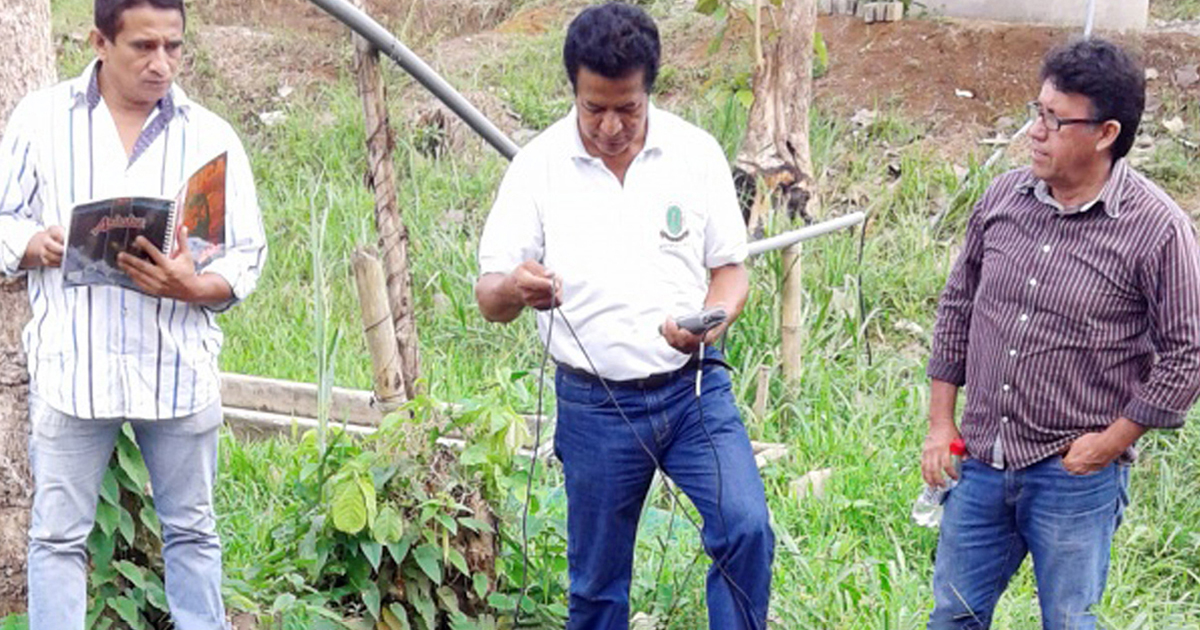UTEQ monitors water quality for fish production in communes of the canton Mocache
Published on 11 from November from 2016

The Research and Development Network on Alternative Productions (RIDPA) - Aquaculture - of the Faculty of Livestock Sciences monitors water sources in the communes of the canton of Mocache.
With the participation of thesis students and teachers Roque Vivas Moreira, Jorge Rodríguez, Martín González, Tito Arguello.
This activity is part of the project of Vinculación de la Universidad Técnica Estatal de Quevedo and has the purpose of knowing the quality of the water in streams, deep wells and artesian wells to determine which of these water sources offer the best characteristics for the development of native and exotic fish.
This linking project on fish farming entitled "Cultivation of native inland fish and tilapia in geomembrane ponds to improve the diet of the rural population", aims to train farmers and fishermen in a new productive alternative through the installation of geomembrane ponds in the communities of Mochache. This project is carried out thanks to an agreement between the Municipality of Mocache and the State Technical University of Quevedo.
Technical Data
Water quality and pond management in tropical aquaculture is essential for the cultivation of aquaculture species. The physical and chemical conditions are of great importance for the good development of the fish, and the success or failure of fish farming depends on the water quality.
The parameters to be taken into account are: physical parameters such as water temperature, both of the water source and of the individual ponds. The growth and development of the fish depends mainly on the thermal growth coefficient (CTC) generated by sunlight, which is recorded using a thermometer. Temperature data should be taken in the early morning, midday and late afternoon.
Another important element for the well-being of the fish is the turbidity of the water which is given by the size of the particles suspended in the water and which can affect the proper functioning of the gills.
However, there is green turbidity which is beneficial to fish, caused by the amount of plankton suspended in the water, which is the main natural food for herbivorous and omnivorous fish.
Turbidity is measured with the secchi disk, which in optimal conditions the water should be between 35 and 40 cm visibility. Another important factor is the amount of dissolved oxygen in the water, which in extensive fish farming depends on the photosynthesis of the plankton, whereas in intensive and super intensive fish farming, mechanical aerators are required to supply the oxygen demand of the fish.
The requirement for the amount of dissolved oxygen in the water depends on the species to be farmed, for cichlid tilapia a minimum of 4 mg/l is required; the pH is another important factor in fish farming, the pH should be between 6, 5 and 9 on a scale of 14, considering that the neutral point is 7.
The alkalinity or concentrations of carbonate and bicarbonate ions in the water should be higher than 75 ml/g per litre of water, in case the calcium concentration of the water does not reach the average amounts, the addition of quicklime and dolomite lime is necessary.
Hardness is the concentration of calcium and magnesium ions in water, its concentration should be above 75 ml/g per litre of water. Ammonia in the water from decomposed organic matter. Fish faeces and leftover feed is lethal, so its control is essential in fish culture. The concentration should not exceed 2 mg/litre of water.
The lack of control and correction of physical and chemical factors in the water causes slow growth and even mass death of fish. It is also necessary to analyse the contamination by concentrations of heavy metals iron, lead, cadmium, arsenic, copper and zinc in the water used for fish farming.
"
